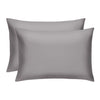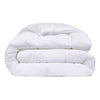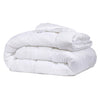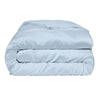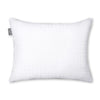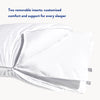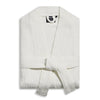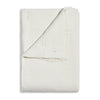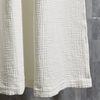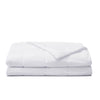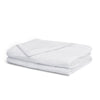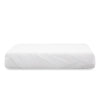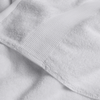The Daily Miracle
How To Rid Your Clothes of That Chemical Smell
Published
January 25, 2024
Author
Suze Dowling

Ever pulled a brand-new shirt over your head, only to be hit by a strong, chemical scent? Or maybe you've washed a load of laundry only to find that not-so-fresh smell still lingering?
It's a common frustration: clothes that carry a stubborn, chemical odor, regardless of how many times they've been through the wash. Who hasn't felt a tad self-conscious when a whiff of that chemical odor escapes as you're out and about?
It can be even more frustrating than stubborn stains. We've all been there, and it's not the most pleasant of experiences. So, let's embark on this olfactory journey together.
From understanding the root causes to exploring innovative solutions, we're here to guide you through the process of turning your wardrobe into a haven of fragrance-free bliss.
What Is That Chemical Smell?
Often, they originate from the manufacturing process. Clothes, especially new ones, may come with a mix of chemicals used in dyeing, finishing, or even during storage.
These chemicals, like formaldehyde or certain sulfates, have a knack for bonding with fabric fibers, making them quite the clingy companions. Understanding this gives us a starting point for tackling the issue head-on.
But it's not just about identifying these chemicals. It's about understanding why they linger. Fabrics are porous, meaning they have tiny holes that can trap these odorous molecules.
The type of fabric plays a role, too. Synthetics might hold onto smells more stubbornly than natural fibers. Also, the chemical composition of these scents often makes them resistant to water and traditional detergents. They're like the uninvited guests at a party who just won't leave.
How we handle our clothes from the moment we purchase them can also affect how these smells interact with the fabric. Whether it's keeping them wrapped up in plastic bags, storing them in confined spaces, or even the first few washes, all these factors contribute to the persistence of these chemical odors.
Armed with this knowledge, we can start to look at effective strategies to tackle them.
Is the Smell Dangerous?
While the chemical smell that can come with new clothes isn’t dangerous per se, it's not just about wrinkling your nose. For some, they're a skin irritant or even an allergy trigger. Ever experienced itching or discomfort after donning a new outfit? It could be those chemical residues at play.
But let’s be real — dangerous or not, no one wants their fashion statement overshadowed by an olfactory offense. The implications go beyond just a temporary discomfort.
Beyond personal health, these smells can affect our mental well-being and confidence. Think about the times you've become self-conscious during a meeting or a social event because of a lingering scent on your clothes.
Feeling fresh and clean isn't just a matter of hygiene. It's closely tied to our sense of self, and how we present ourselves to the world — and how the world perceives us.
Traditional Laundry Solutions and Their Limitations
The go-to move is often to toss those smelly clothes in the wash with your regular detergent. While this can help, sometimes these traditional detergents just don’t cut it.
They might mask or reduce the smell but completely eliminate those tenacious chemical odors? That's a whole other ball game.
This is where understanding the limitations of conventional detergents becomes crucial. Most of these products are designed to tackle dirt and general odors but aren't formulated to break down specific chemical compounds found in manufacturing odors.
Furthermore, they often contain their own mix of chemicals, which not only add to the problem but can also be harmful to sensitive skin. It's like fighting fire with fire; in the end, the stubborn chemical smells often prevail.
Miracle Made® Laundry Detergent Sheets
Miracle Made® Laundry Detergent Sheets address all these concerns and more in one simple, convenient package. Thanks to their unique formulation, these sheets pack a punch against stubborn odors.
They’re not just about deep cleaning. They do so without the harsh chemicals, making them a win-win for your nose and skin. This innovation marks a significant departure from traditional laundry methods.
Our detergent sheets are also a testament to the growing desire for sustainability in household products. They demonstrate how eco-friendly choices don't have to compromise on quality or effectiveness. Their compact design also means less packaging waste and reduced carbon footprint due to lighter shipping.
The beauty of such innovations lies in their simplicity and effectiveness. No more measuring out liquid detergent, no more messy spills.
Just a simple sheet that does the job efficiently and leaves your clothes free from chemical odors. It’s a hassle-free solution that fits seamlessly into the modern, eco-conscious lifestyle.
What About Home Remedies?
Natural solutions, like baking soda or distilled white vinegar, can be surprisingly effective against chemical smells. Baking soda has odor-absorbing properties, making it a handy ally.
Baking soda neutralizes pH levels, which can be effective against acidic compounds responsible for some odors. It’s a simple, readily available, and cost-effective solution. Add a cup to your wash cycle, and you might just notice a difference.
Similarly, white vinegar, with its acetic acid content, can break down alkali substances often found in detergents and softeners, tackling the odor issue from a different angle. Vinegar can break down those odor-causing chemicals — just add half a cup to your rinse cycle.
Airing out, too, is an age-old method. It’s not just about letting your clothes catch some fresh air, either. It's also about exposing them to sunlight, which can act as a natural disinfectant, further helping to eliminate stubborn scents.
While these solutions might require a bit more effort and patience, they are a testament to the power of simple, eco-friendly methods in our daily lives.
How Can Fabric Types Impact This Concern?
Different fabrics have different relationships with odors. Natural fibers like cotton, linen, and wool are more breathable, allowing air to circulate and disperse odors.
On the other hand, synthetics often have tighter weaves and less breathability, making them odor traps. This isn't to say you should avoid synthetic fabrics, but being aware of their properties can help you manage odors more effectively.
Care labels provide vital information on water temperature, washing cycle, and drying methods, all of which can impact odor retention.
Basically, care labels are your roadmap to keeping your garments in top-notch condition and odor-free. Following these guidelines can make a significant difference in how your clothes retain or release those unwelcome scents.
The Bottom Line
Battling chemical smells in your clothing doesn't have to be a headache. With the right approach, a bit of know-how, and the help of innovative products like Miracle Made® Laundry Detergent Sheets, you can keep your clothes smelling fresh and chemical-free.
By adopting these strategies, you can significantly reduce the presence of unwanted odors, leading to a more pleasant and comfortable wardrobe experience. With each wash, you're not just cleaning your clothes; you're enhancing your daily comfort and confidence.
Sources:
Your Complete Guide To Understanding Care Labels | Planet Care
Laundry Hygiene and Odor Control: State of the Science | National Library of Medicine


